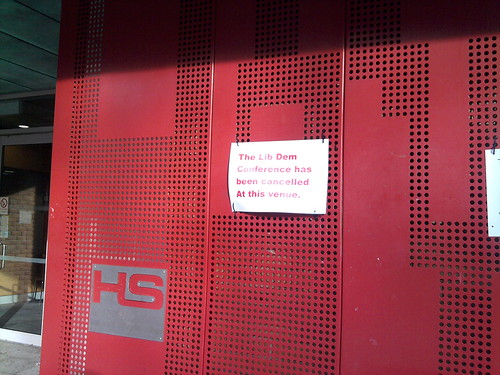There's a strong argument that there are plenty of publications that do gadget reviews. We used to say on MCI that "we are not a gadget mag". Indeed. So chop it out, unless it really is advertorial rather than editorial that happens to be shit. And if it's paid for, it's polite to say so. Also, given the bulk and kind of ads they carry, they really have no right to be playing daft games with filler. In the latest issue, there are a total of two ads for anything I expect ever to be able to afford and both of them are for web hosting services.
It's a pity, though, that having used one of those advertisers' e-mail hosting and picked endless spam out of Fistful from the other's compromised hosts, I wouldn't use either of them in a fit. This is the tone of the whole thing - the design is fancy, but it's not structural. It's there to look at, not through, or better, with. The writing tends to be tech-y, not techy. The piece on synthetic biology in this month's paper, for example, could have got into a national newspaper, it's that lightweight. (On the other hand, the piece on re-designing Mecca's infrastructure to keep pilgrims from getting killed was genuinely interesting, but crammed into a corner.) The photography is good, and the production is luscious, but here's the problem: high gloss is ads, not content. The columnists are reliably disappointing: Warren Ellis doesn't say anything you couldn't get from his blog, and anyway, if you're going to hire him, why not hire him to do what he does for real? Some people would buy it for Ellis cartoons alone. And there's the guy whose career is based on having marketed MS Internet Explorer, a product you get forced on you when you buy a new PC, and that you have to get rid of by surgery before it explodes messily. That's like marketing the appendix.
But it wouldn't be so bad if it wasn't for David Rowan's risible leader column. This month, he decided to cover, or at least mention, Dave from PR's trip to Shoreditch to say how great Internet start-ups were. Unfortunately, all he could find to say was that the industry needed:
"tax incentives, networking events, and an ability to hire and fire more easily to attract people like Le Meur back".
Well, the first adds up to "gimme subsidy", the second is vacuous (and self-interested), and the third is pernicious. Most new businesses die within three years of launch and their employees go down with the ship, so by definition this can't be all that important. But if you work for the contract cleaners, I suspect this is significantly more important to you. There's another hiring constraint, though, that really is relevant here: immigration restrictions. We know much bigger companies have been complaining through the CBI about the new numerical cap on immigration. Strange, no mention of that, especially as it's the current government's own, direct, and specific fault. (And we could also be snarky about the fact Loic Le Meur's business puts on a conference every year in Paris, that well-known paradise of hardcore libertarianism.)
If Rowan had wanted to cover the Cameron trip, though, there was a good story in there for a real journalist. Rumours included that staffers from No.10 had called up BT and suggested that they might want to put in free WLAN "from Old Street to the Olympic Park", with no suggestion that there would be any funding for this. Another suggests that they asked if BT would consider moving their enormous R&D centre from Martlesham Heath to the East End, a hilariously enormous project and one that takes no account of the major operational infrastructure BT has at MHRC.
Less sarcastically, if you're a community broadband project, you're not allowed to offer service to any kind of business if you're using BT passive infrastructure. And you've got to pay business rates on your network as soon as it's built, while the incumbents can wait until it's in service and earning money. There's an OFCOM consultation on the small business telecoms market that's been hanging fire for ages. Journalism!

